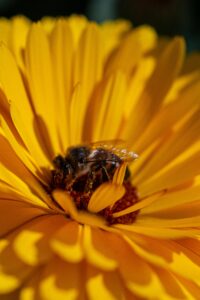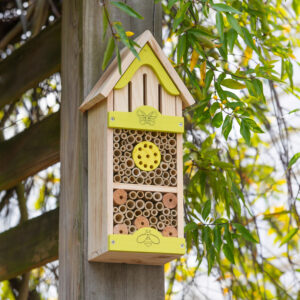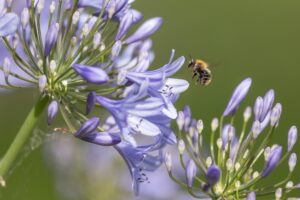In the sunny state of Florida, where the landscapes are teeming with vibrant flora, there’s a tiny powerhouse that often goes unnoticed—the incredible bee. These industrious pollinators are unsung heroes, vital for supporting biodiversity and ensuring a bountiful harvest. At Canterbury Farms Nursery & Garden Center, we recognize the significance of bees and their role in our ecosystem. In this article, we’ll explore the importance of bees, the challenges they face, and provide practical tips to encourage these amazing creatures to thrive in your Florida yard.
The Significance of Bees
Bees are nature’s little champions, tirelessly flitting from flower to flower, spreading pollen and enabling the pollination process. Their hard work contributes to the growth of fruits, vegetables, nuts, and seeds. Did you know that honey bees alone inject over $20 billion annually into the U.S. economy through their pollination services? In Florida, where agriculture thrives, bees are instrumental in pollinating crops like citrus fruits, blueberries, melons, and more.
But the importance of bees goes beyond just supporting our agricultural system. They play a vital role in maintaining the delicate balance of ecosystems by promoting biodiversity. When bees visit flowers in search of nectar and pollen, they inadvertently transfer pollen grains from the male part of one flower to the female part of another, facilitating fertilization and seed production. This process allows plants to reproduce and generate new generations of diverse plant species.
Challenges Facing Bees
While bees play a crucial role in our environment and food production, they face numerous challenges that threaten their survival. Habitat loss is one of the most significant issues affecting bee populations. As urbanization and agriculture expand, natural habitats are being destroyed or fragmented, leaving bees with fewer places to nest and forage for food.
Pesticide exposure is another major concern. Bees can come into contact with harmful pesticides while foraging on plants treated with these chemicals. Pesticides can have detrimental effects on bees, impacting their navigation abilities, foraging behavior, reproduction, and overall health. It is important to minimize pesticide use and opt for bee-friendly alternatives whenever possible.
Climate change also poses challenges for bees. Rising temperatures, altered precipitation patterns, and shifting seasonal cycles can affect the availability of flowers and disrupt the synchronized timing between bees and their plant partners. These changes can impact the foraging opportunities for bees and disrupt the delicate balance of pollination.
Diseases and parasites, such as Varroa mites, also pose significant threats to bee populations. These pests weaken bees, making them more susceptible to diseases and compromising their ability to carry out essential pollination activities.

Photo by Yoksel 
Encouraging Bees in Your Yard
Creating a bee-friendly environment in your own yard is a meaningful step towards supporting these incredible pollinators. Let’s explore some practical suggestions from the University of Florida’s Institute of Food and Agricultural Sciences (IFAS) to encourage bees to visit and thrive in your Florida yard:
- Plant Native Wildflowers and Blooming Plants
Native plants are adapted to Florida’s climate and provide an excellent source of nectar and pollen for bees. They have evolved alongside native bees and other pollinators, forming beneficial relationships. Choose a variety of plants that bloom at different times throughout the year to provide a consistent food source for bees. Some great native wildflowers for Florida include Tickseed (Coreopsis spp.), Blanketflower (Gaillardia spp.), and Purple Coneflower (Echinacea purpurea).
- Provide a Water Source
Bees need access to clean water for hydration, especially during hot and dry periods. Create a shallow water source, such as a birdbath or shallow dish, and place pebbles or twigs in it to provide a landing spot for the bees. Remember to keep the water fresh and refill it regularly.
- Minimize Pesticide Use
Reduce or eliminate the use of pesticides in your yard, especially during flowering periods. Pesticides can be harmful to bees and other beneficial insects. If necessary, opt for bee-friendly, organic pest control methods and always follow the recommended application guidelines. Consider integrated pest management (IPM) techniques that focus on prevention, monitoring, and using targeted treatments when necessary.
-

Photo by Evergreen Enterprises
Create Nesting Sites
Many bees are solitary and require suitable nesting sites to lay their eggs and raise their young. Leave some areas of bare soil in your yard, as these serve as nesting grounds for ground-nesting bees. Provide natural materials like twigs, dead leaves, and small branches to create habitat opportunities for cavity-nesting bees. You can also install bee houses specifically designed for native bee species, which can be purchased or made using materials like bamboo tubes or drilled wooden blocks.
- Preserve Dead Plant Stems
Certain bee species use hollow plant stems as nesting sites. By leaving some dead plant stems intact, you provide shelter and nesting opportunities for these important pollinators. Resist the urge to tidy up your garden completely during fall or winter and allow some stems to remain standing until spring.
- Educate Others
Spread awareness about the importance of bees and the actions we can take to protect them. Share your knowledge with neighbors, friends, and community members. Encourage them to join you in creating bee-friendly habitats in their own yards. Together, we can make a significant impact on bee conservation.
Putting It All Together
Bees are invaluable pollinators that play a crucial role in supporting biodiversity and ensuring the success of our agricultural systems. By taking steps to encourage bees in our Florida yards, we can create safe havens that promote their health and abundance. Embracing native plants, providing water sources, minimizing pesticide use, creating nesting sites, and preserving dead plant stems are simple yet impactful actions we can take to support these remarkable pollinators.
So, let’s roll up our sleeves and transform our yards into bee-friendly oases. By embracing biodiversity and nurturing bees, we can contribute to a healthier ecosystem, a thriving natural world, and a sweeter future for all.
For more information, visit these sites:

